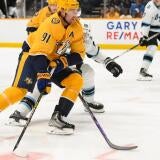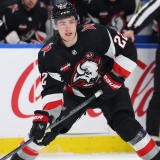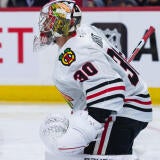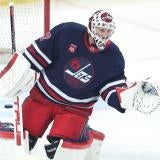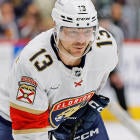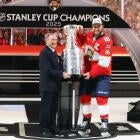2017 Fantasy Hockey Draft Prep: Kevin Shattenkirk, Alexander Radulov highlight free agency recap
Kevin Shattenkirk, Alexander Radulov and Scott Darling are part of an interesting class of players who have changed teams. Here's a look at what we expect from them.
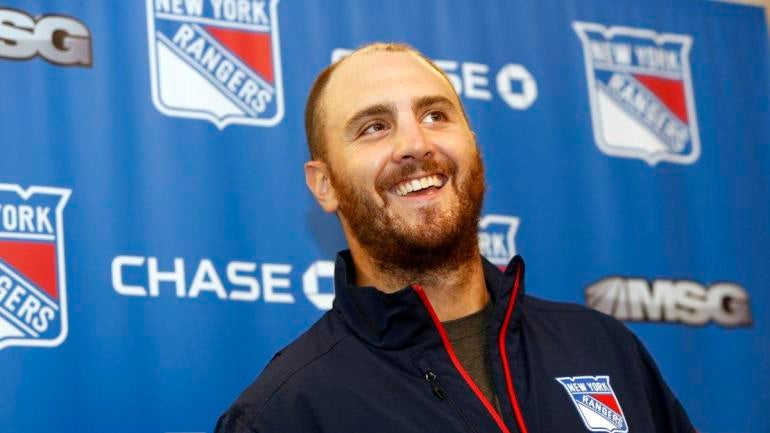
As always, July 1 kicked off a rush of free-agent signings around the league, but this summer's frenzy is a little bit special, with the NHL's expansion into Las Vegas seemingly having resulted in more moves than ever.
Kevin Shattenkirk, D, New York Rangers
He left years and money on the table to sign with his childhood favorite team, and Shattenkirk instantly transforms an aging and slow Rangers defense into one that can put the opposition back on their heels.
Since he entered the league, only nine defensemen have more points than Shattenkirk, who is coming off a career-high 56 points and has now scored at least 44 points in four straight seasons. He's expected to improve a power play that ranked 11th last year, and his 27 power-play points would've ranked first on the Rangers. This addition certainly takes some pressure off Ryan McDonagh while giving the Rangers the elite power-play quarterback they've long been missing.
Alexander Radulov, RW, Dallas Stars
Everyone understands the risk of signing a 30-year-old to a five-year deal after one good season, but everyone also understands just how good the Stars' top line will be with Radulov joining Jamie Benn and Tyler Seguin. Those three should form one of the best first lines in the league, and all three will be highly motivated to push the Stars into higher orbit. Seguin and Benn combined for 141 points last season, which is considered a poor year for them, and the word out of Montreal is that Radulov was one of the team's hardest-working players. Radulov will be able to leach some points by virtue of playing with the best linemates he's ever had, and if he can shoot the puck a little more often, there's no question that he has the ability score 20-plus goals and rank among the top 50 in league scoring. Even if Radulov doesn't play with Benn and Seguin, the Stars can also pair him up with Jason Spezza, who's scored at least 50 points every season since his rookie year.
Scott Darling, G, Carolina Hurricanes
Cam Ward still gets first crack at be No. 1 goaltender job because of his seniority and what he's done for the organization, but there's no question Darling has been the better netminder since breaking into the NHL. He filled in admirably as a starter when needed in Chicago, finishing the season with a 2.38 GAA and .924 save percentage, and now he gets his first chance to start on a full-time basis. Common sense dictates the Hurricanes will go with a timeshare in net until one guy emerges as the starter, but the smart money is certainly on Darling. He'll also have the benefit of having an impressively mobile (if young) defensive corps in front of him; Carolina did a great job clearing the puck and preventing shots last season.
Jonathan Bernier, G, Colorado Avalanche
Coming off a bounce-back season in Anaheim -- 21-7-4 with a .915 save percentage and 2.50 GAA -- after losing the starting job in Toronto, Bernier signed a one-year deal with Colorado and is looking to prove once again that he's capable of being a No. 1. It's a great deal for both sides because it buys some time for Colorado to figure out a long-term plan and gives Bernier a chance to shine if Semyon Varlamov's groin keeps bothering him. There are, however, two big factors that are working against Bernier: his maddening inconsistency and a defense that's expected to be one of the worst in the league once again.
Patrick Marleau, LW, Toronto Maple Leafs
The long-time Shark will close out his career with the Leafs after signing a three-year deal that will pay him more than $6 million per season. His playoff disappointments are well documented, but even without a Cup or any major individual awards, Marleau's resume is impressive: 1,082 career points, including six 30-goal seasons and a 44-goal season. It remains to be seen which line Marleau will play on, but does it really matter? The Buds are young and talented, and the hope is that their exuberance will rub off on the 37-year-old. He's scored at least 25 goals and 45 points in each of the past two seasons, and that's a very reasonable expectation for 2017-18.
Evgeni Dadonov, LW/RW, Florida Panthers
Dadonov returns to the NHL after a six-year hiatus, having signing a three-year, $12-million deal, and he's undoubtedly a different player now than he was before, when he scored just 20 points in 55 games in three seasons with Florida from 2009 to 2012. The two-time KHL champion capped off a season in which he finished fourth in team scoring with 66 points in 53 games on a stacked SKA St. Petersburg club, and he'll be tabbed as one of the team's top-six wingers after the Panthers jettisoned four of their top five wingers from last year. He's a much more polished offensive player than he ever was, so a 25-goal season isn't out of the question, and Florida has three capable centers in Aleksander Barkov, Nick Bjugstad and Vincent Trocheck to set him up.
Sam Gagner, RW, Vancouver Canucks
Gagner was brought in for one purpose: to improve Vancouver's dreadful power play, which ranked 29th in the league last year. He scored eight goals and 18 power-play points for Columbus last year, which would've led all Canucks, and being a right-hand shot means he could play with the Sedins on the first unit. Maybe Vancouver didn't have to commit three years to Gagner -- who's now on his fifth NHL franchise at age 27 -- but they'll have significant salary coming off the books over the next two summers, and he's a serviceable stopgap before the team hands over the reins to its young core. Asking Gagner to repeat his career-high 50-point performance from last year is a tall order, considering Vancouver's lack of offense, but perhaps returning assistant coach Newell Brown -- who managed Vancouver's No. 1 ranked power play in 2011 -- will find a way to get the most out of him.
Justin Williams, RW, Carolina Hurricanes
Mr. Game 7 cashed in on what may his final NHL contract with a two-year pact worth $9 million. Even though he's leaving the reigning Presidents' Trophy champions, the Hurricanes are one of the most intriguing up-and-coming teams, and they need an experienced veteran to help guide them through rough waters. He's been a model of consistency throughout his career, and excluding the lockout-shortened campaign, he's scored at least 40 points in each of his past six seasons. Williams will be a top-nine winger who can move up and down the lineup and will have plenty of young scorers around him.
Patrick Sharp, LW, Chicago Blackhawks
The Blackhawks would've liked to keep Sharp, but salary cap constraints forced them to part ways two seasons ago; however, a forgettable final season with Dallas (18 points in 48 games) led to a reunion in which Sharp signed a low-risk, one-year deal worth $800,000. Exactly how effective Sharp can be remains to be seen, but when healthy, he's a high-volume shooter who can provide depth scoring on the left wing, something that Chicago was sorely lacking last year. Sharp has failed to score 20 goals just three times since the 2005-06 season, and a chance to play alongside Patrick Kane means the only way to go is up.
Jason Pominville, RW, Buffalo Sabres
The 34-year-old just enjoyed a nice bounce-back season with the Wild, netting 47 points in 78 games (an 11-point improvement), but it's also been six years since he's scored at least 20 goals. He's almost exclusively a right winger, which slots him on the third line in Buffalo behind Kyle Okposo and Sam Reinhart; that's a good fit because Pominville is no longer a reliable top-six winger, but he can certainly be a serviceable depth scorer. He enjoyed some of his best seasons as a Sabre, so perhaps a return to his roots will further reinvigorate his offense.
Despite a losing record (18-29-6), Miller was the Canucks' MVP for long stretches last season, and in three seasons with Vancouver, he posted a .914 save percentage and 2.69 GAA. However, it's pretty clear that the 36-year-old can no longer shoulder a starter's workload, and he only appeared in 54 games last season because an injury kept Jacob Markstrom from seizing more of the starts. In Anaheim, he'll back up John Gibson, but Miller is still good enough to command at least 20 or 25 starts, and once Sami Vatanen and Hampus Lindholm (both with shoulder injuries) are back in the lineup, he'll have plenty of help in front of him. Miller has finished with a save percentage below .911 just once in his career when appearing in at least 20 games.
Radim Vrbata, RW, Florida Panthers
The 36-year-old winger is guaranteed a top-six role after the Panthers overhauled their roster, and he'll likely take Jaromir Jagr's place as the top right winger on a team that may have trouble scoring goals. He's coming off a 20-goal, 55-point campaign with the Coyotes, and even if he doesn't match those totals, Vrbata can create a lot of scoring opportunities with the high number of shots he takes. Vrbata has fired at least 200 shots in six of his past seven seasons, not including the lockout-shortened 2012-13. Just don't expect much, though, because it seems like the only team Vrbata has been able to make a lasting impact on is the Coyotes under Dave Tippett.
Nick Bonino, C, Nashville Predators
Bonino is a perfect fit for the Predators, who needed a reliable checking center with Mike Fisher retiring. After signing a four-year, $16.4 million contract, he'll step in as the team's top penalty killer; that'll take some pressure off not only Calle Jarnkrok but also Ryan Johansen, who no longer has to go head-to-head against the opposition's top centers. Bonino is not known as a scorer -- he managed just 37 points last year -- but with the Preds' deep cadre of wingers and Peter Laviolette's emphasis on offense, it's conceivable that he builds on that total. Just don't expect him to break out offensively, as he won't be deployed in prime scoring situations.
Chris Kunitz, LW, Tampa Bay Lightning
Kunitz leaves Pittsburgh after nine years that saw him win three Stanley Cups and an Olympic gold medal, signing a one-year deal worth just $2 million with Tampa Bay. He scored a career-low nine goals last year following back-to-back 40-point seasons and is looking for one final hurrah at age 37. If the Lightning elect to keep the Triplets line together, that means Kunitz could line up on Steven Stamkos' left wing, and the veteran is no stranger to playing with elite centers. His best years are clearly behind him, but the Lightning are expected to challenge for the Stanley Cup with a very talented roster, so a bounce-back year isn't out of the question. He'll play much the same role in Tampa that he did in Pittsburgh, with his power-play opportunities likely scaled back a bit.
Spencer Foo, RW, Calgary Flames
Foo was one of the most highly sought-after NCAA players this summer, but the track record for undrafted college players jumping straight to the NHL isn't very good. He scored 62 points in 38 games in his junior season on a very good Union College squad, but with his slight build and inexperience, Foo will be hard-pressed to crack the Flames' roster. It's more likely that he gets acclimated to the pros in the AHL before making the jump to the big leagues.
Martin Hanzal, C, Dallas Stars
The Hanzal experiment in Minnesota was widely panned because he never quite looked comfortable in his new surroundings, but that's not very surprising -- he'd only ever played for the Coyotes prior to the trade, and Dave Tippett and Bruce Boudreau are near-perfect opposites. The situation was exacerbated by the high price the Wild had to pay for his services, but one thing came just as advertised: He won faceoffs with frightening efficiency (58 percent). He'll play a smaller role for the Stars, his third team in two seasons, but a checking role without major offensive responsibilities is perfect for Hanzal, and few can compete with his 6-foot-6 size and strength. Hanzal has never scored more than 41 points in a season, and he may have a chance to eclipse that total with a very talented Stars offense, but don't expect that to be his primary focus.
Trevor Daley, D, Detroit Red Wings
The Red Wings' defense was in shambles last year, with only Mike Green and Danny DeKeyser appearing in more than 70 games and only Green scoring more than 13 points. Daley is not known for his offense, but he's an excellent passer who should help the Wings transition out of their own zone. At 33 years old, the hard minutes and physical toll of blocking shots seems to have caught up to Daley, who appeared in only 56 games with the Penguins last year after undergoing knee surgery in the middle of the season. He's going to play a top-four role, but you wonder if the Wings -- who just missed the playoffs for the first time since 1990 -- should focus on their blossoming young players instead of relying of aging veterans to do the job.
Jussi Jokinen, LW/RW, Edmonton Oilers
Jokinen was bought out by the Panthers as part of Dale Tallon's forced exodus after the team took a huge step backward, including the Finn's offensive production dropping by 32 points. He's since joined the Oilers on a one-year deal that will see Jokinen begin the season as the third-line left wing, but his versatility and dependability could see him move up the depth chart. One of the reasons the Oilers signed Jokinen was to have him mentor Jesse Puljujarvi, so the real benefactor of this signing will be the youngster, but even just by riding on the coattails of Edmonton's offense, Jokinen should easily improve on last year's 28 points.
Mike Cammalleri, LW, Los Angeles Kings
Cammalleri returns to the team that originally drafted him after being bought out by the Devils following a season that saw him total 10 goals in 61 games thanks to a career-low 7.0 shooting percentage; he even sat out the occasional game as a healthy scratch. The Kings scored the fifth-fewest goals in the league last year, so adding Cammalleri on a one-year, $1 million contract made sense, but expecting the 35-year-old to solve the team's offensive struggles is a pipe dream. Cammalleri could start the season on Anze Kopitar's left wing, but the last time Kopitar was paired with a past-his-prime sniper in Marian Gaborik, the results were mixed at best.
Karl Alzner, D, Montreal Canadiens
He cited Washington's playoff struggles as a reason why he wanted a change of scenery, but how well will Alzner do with a bigger role on a team that hasn't made it past the second round in the past three seasons as well? The 28-year-old is a steady and reliable defenseman who hasn't missed a single game since the 2010-11 season, and he'll likely partner up with Shea Weber on the team's top pairing. Alzner is in his prime, so there's still room for improvement, but expectations must be tempered for someone who isn't known for elite skill. The only way he can improve his offensive production is if he's the primary setup man for Weber's bombs from the point.
Nail Yakupov, LW/RW, Colorado Avalanche
Only on a lowly team like the Avalanche would Yakupov have a chance to nab a top-six role, as the No. 1 pick from the 2012 draft has very few chances remaining; he's already being labeled one of the biggest busts in history. In 292 career games, Yakupov has scored just 53 goals, and he failed to receive a qualifying offer from the Blues after managing just three goals and nine points in 40 games. Over his five seasons in the NHL, he has an ugly minus-91 rating -- 14 ticks worse than the next-lowest total during that span. Nothing from his previous seasons suggests Yakupov will fare much better in Colorado, and the Avs will never improve if their young forwards keep showing a severe allergy to playing defense, especially with one of the weakest blue lines in the league.
Scott Hartnell, LW, Nashville Predators
He was never a good skater to begin with, and Hartnell's declining production over the past three seasons as well as a brief banishment to the press box led to his buyout, which paved the way for him to return to the club that drafted him in 2000. The 35-year-old will provide veteran leadership from the team's bottom-six ranks, and if he can score 37 points like he did last year, the Predators will have gotten good value out of him. The question, though, is whether Hartnell can keep up in Peter Laviolette's up-tempo style.
Brian Boyle, C, New Jersey Devils
Boyle provides a strong presence in the faceoff circle and veteran leadership in the locker room, and his defensive prowess could take some pressure off Adam Henrique, Travis Zajac and Pavel Zacha, allowing that trio to focus on offensive production after combining for just 109 points last year. He'll also help improve the Devils' 23rd-ranked penalty kill and likely play a bigger role overall than he did in Toronto, but Boyle's offensive limitations mean he'll probably score no more than about 30 points this season. He's an inexpensive but effective option at $2.75 million annually for two years.
Brian Elliott, G, Philadelphia Flyers
Forced out of Calgary after an inconsistent regular season and a disappointing playoff showing, Elliott finds himself in a timeshare in Philadelphia, where he doesn't have the benefit of playing behind one of the league's best defensive corps. The 32-year-old has not started more than 50 games since the 2010-11 season (which was also his worst), and he faces an uphill climb to do so now, with Michal Neuvirth expected to get first crack at the job. Elliott's career .913 save percentage is only buoyed by two separate seasons in which he registered .930 and .940 marks, but he also started fewer than 38 games in each instance. Considering the stretch of poor goaltending that has plagued the Flyers, expectations for Elliott should be tempered.
David Desharnais, C, New York Rangers
The diminutive center played a minor role in Edmonton following a midseason trade, but he certainly fits the Rangers' strategy of getting faster. With Mika Zibanejad, Kevin Hayes and possibly J.T. Miller playing center, Desharnais will likely play a bottom-six role even though he's not really physically suited to be a checker. The Rangers don't have to worry much if Desharnais doesn't pan out because he's on a one-year contract, and he can also play on the wing if need be. He's averaged just 30 points per season over the past two campaigns, but Desharnais has also sat out games as a healthy scratch.
Benoit Pouliot, LW/RW, Buffalo Sabres
Bought out to create cap room for the Oilers to re-sign Kris Russell, Pouliot also didn't make a strong case to remain with the team, as he's coming off one of the worst seasons of his career. Pouliot scored just
eight goals and 14 points in 67 games on a team that ranked eighth in goals scored, showing just how minute his contributions were. At 30 years old, he should have plenty of good hockey left in him, but he'll have to work his way back up from the bottom-six ranks after signing a one-year, show-me contract. If he can return to his 30-point form, the Sabres get great value and Pouliot gets a chance to land a more lucrative contract.
Michael Del Zotto, D, Vancouver Canucks
Like Gagner, Del Zotto was signed to bolster a power play that scored just 32 goals last season. After a promising start to his stint with the Flyers, Del Zotto managed to score just 31 points over the past two (injury-plagued) seasons, ultimately being usurped by Ivan Provorov on the power play. Having Del Zotto should help shelter Ben Hutton and Troy Stecher as they continue to develop, and it'll also force Alex Edler and his four power-play points into a reduced role. The offense-first Del Zotto is still a liability in his own zone, which will prevent him from playing a top-four role at even strength, but at least he's on a relatively cheap, two-year contract.
Dmitry Kulikov, D, Winnipeg Jets
Kulikov's only season with the Sabres was a disaster, as he appeared in just 47 games due to injury and notched just five points with a minus-26 rating. He gets a fresh start in Winnipeg, where he won't have to play a marquee role, and Kulikov solidifies the left side of a defense that includes the aging Toby Enstrom and still very green Josh Morrissey. When healthy, Kulikov is an above-average hitter and shot blocker, and his solid defensive play could pave the way for his blue-line partner -- likely Tyler Myers -- to jump up into the play.
Steve Mason, G, Winnipeg Jets
Mason wasn't completely awful with the Flyers, going 104-78-36 with a .918 save percentage over five seasons, but it wasn't good enough to keep him in the City of Brotherly Love. In Winnipeg, Mason will serve as a mentor to Connor Hellebuyck, who's seen as the goalie of the future, but the veteran will still get his fair share of the starts. After all, Mason has 381 more career appearances than Hellebuyck, and the Jets' defense could benefit from someone with a little more experience. How the timeshare between Mason and Hellebuyck will work remains to be seen, but don't be surprised if Paul Maurice simply goes with the hot hand.
